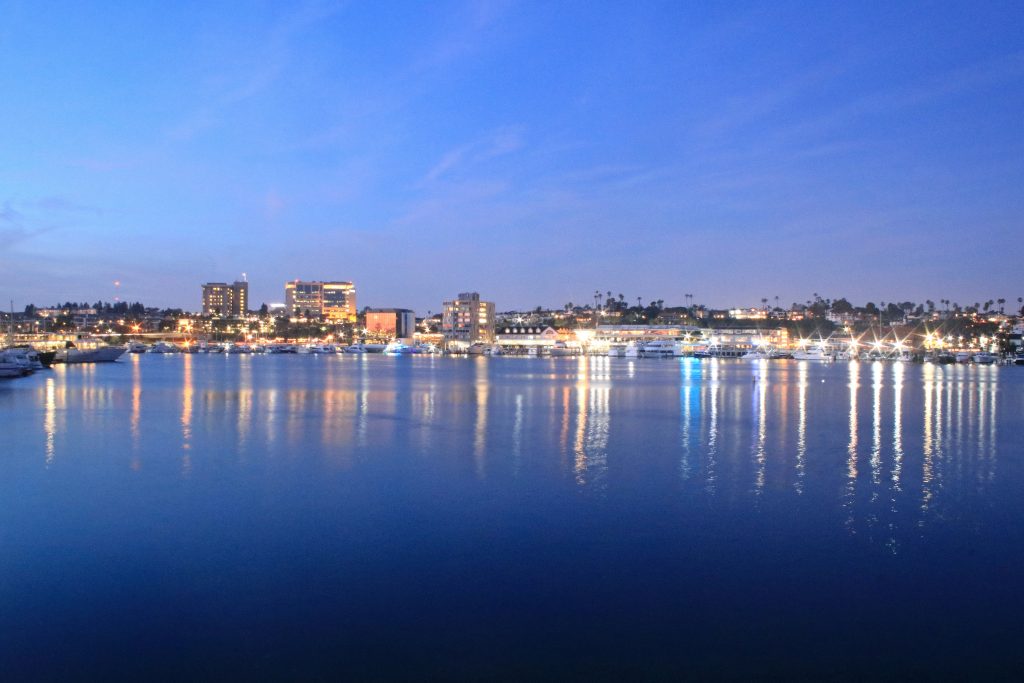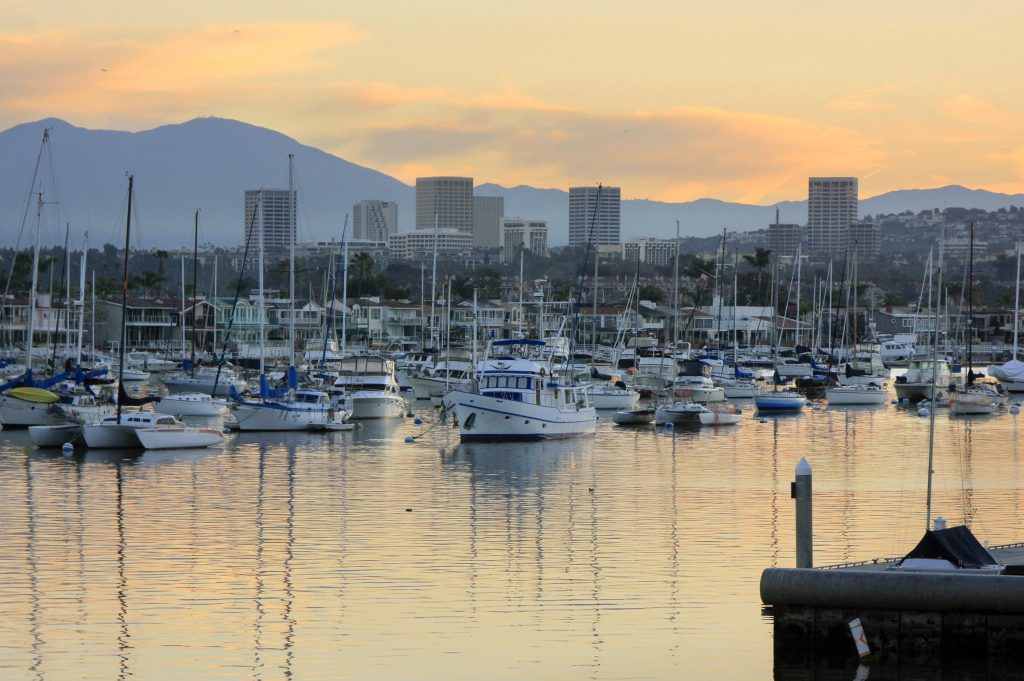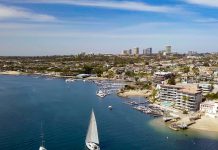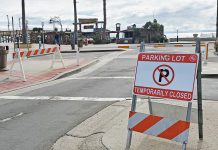
— Photo by Sara Hall ©
As some have coined 2018 “Year of the Harbor” in Newport Beach, the idea of a “Port Master Plan” is making waves.
The possible PMP was the focus of the Newport Beach Chamber of Commerce Marine Committee’s discussion Tuesday. About 40 people, including city staff, Council members, Harbor Commissioners, local residents, and business owners, gathered at Marina Park for the monthly meeting.
Don Schmitz, a longtime California Coastal Commission consultant to the city and who previously worked as CCC’s principal planner for the South Coast District, was the featured speaker.
“What we have accomplished as a community… is actually very impressive,” Schmitz noted.
He referenced Marina Park as an example. There were many challenges to overcome and red tape to wade through in order to make the facility a reality, including the lighthouse height and palm trees species, he explained.
Schmitz also represented the city working on the Local Coastal Program, which is “basically a general plan for the coastal zones,” he explained. Newport Beach’s LCP was a huge accomplishment, he said.
Newport Beach’s LCP Implementation Plan was unanimously approved by the California Coastal Commission in 2016. The LCP allows state-required Coastal Development Permits to be approved by the city, rather than submitting plans to the CCC.
But the LCP stops at the bulkheads, Schmitz explained. Anything past that requires a permit approved by the Coastal Commission.
City staff has likened the Port Master Plan to a water-based version of the city’s LCP.
In chapter eight of the Coastal Act, PMPs allow designated communities to have, essentially, “an LCP from the water’s edge, out,” Schmitz said.
Last week, Newport Beach City Council approved a professional services agreement not to exceed the amount of $120,000 with Schmitz and Associates, including work with Henschel Government Affairs, as part of the effort to authorize the city to develop and file a Port Master Plan.
The Council’s move on March 27 supported Assembly Bill 2464, co-authored by state Assemblyman Matthew Harper and Senator John Moorloach, which includes adding Newport Beach to the Coastal Act’s list of communities allowed to have PMPs.
Council’s action also approved Schmitz’s company to lobby the Coastal Commission and officials in Sacramento in an effort to amend the Coastal Act to allow Newport Beach to file the PMP document at a later date.
“First and foremost we have to have the authority to have a Port Master Plan,” he said.

— Photo by Sara Hall ©
That would give the local jurisdiction, in Newport Beach’s case it would be the Harbor Commission, the authority to issue their own Coastal Development Permits for repairs, maintenance, and improvements.
City Manager Dave Kiff previously explained that the Port Plan is a potential solution to the question of whether or not the city can gain greater control over basic harbor capital efforts, both public and private, like small dredging projects or pier improvements.
“These are all projects that happen today,” Kiff said at the March 27 Council meeting. “I don’t think anyone envisions this to opening the door to projects that are unlike the ones we see today.”
The CCC would not allow changes in building height or bigger docks in any plan they may eventually approve, Kiff said last week. They would create a template and send it down to Newport Beach, allowing the city to approve smaller projects, but only in the same manner that the CCC would do it, he explained.
It doesn’t have to change the usage or character of the harbor, Schmitz said Tuesday.
“A ‘port’ doesn’t mean it has to be an industrial port with container ships and petrochemical facilities,” he said. “That’s just nonsense.”
There’s no such thing as a ‘harbor’ master plan in the Coastal Act, that’s why they’re trying to piggyback onto the Port Master Plan section, Schmitz explained during the March 27 Council meeting.
“Please don’t get concerned, and I say this to the community, in regards to the semantics of calling it a port,” he said.
There still have to be community meetings, commission discussions, and studies, before the Newport Beach Port Master Plan can be reviewed (and potentially approved) by City Council and then head up to the Coastal Commission to consider, Schmitz explained on Tuesday.
“What a Port Master Plan is and is not, is dependent upon us,” Schmitz said.
There has to be communication and steps to assuage any legitimate concerns, he said. Schmitz expects a “vigorous discussion about the pros and cons” of the plan.
“There has to be a spirit of compromise,” Schmitz said. “Nobody prevails in this line of work by beating your fists on the table on the dais.”
During the March 27 Council meeting, several residents expressed concern about the item, primarily regarding transparency of the process, the company being hired without a bid for others, what comes along with being labeled a “port,” the plan possibly allowing for taller building heights and more development
The public hasn’t been given much information on what the possible Port Master Plan might entail, said local Joy Brenner.
The general concept sounds like a good idea, but there are many questions, added longtime resident Nancy Skinner.
A few residents were doubtful the Coastal Commission would approve such a plan for Newport Beach, which has had a reputation as a “rich community” that walls itself off, said one local. It’s a waste of money to go forward with the effort, he added.
On Tuesday, Schmitz said Newport Beach has shed that reputation in the eyes of the CCC.
Although he said he still has a lot of work ahead of him, the initial feedback he’s getting from Coastal staff is largely positive, Schmitz said.
At last week’s Council meeting, Kiff explained that he envisioned the bill as the first step, unlocking the door, he said. The development of the plan itself will actually take years and that’s where the public would be involved, Kiff noted.
It will take six to nine months to get the bill approved, Kiff estimated, and another four to five years to develop the plan and get the CCC to consider it.
The most likely outcome from all of the deliberations and discussions is an outline of what the city and residents want.
“We’ll take a snapshot of what we have right now and that’s what will be the basis for a map in regards to what it is we’re going to adopt for our Port Master Plan,” Schmitz explained. “This is strictly to empower us as a community.”




